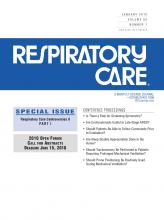Abstract
The acute respiratory distress syndrome (ARDS) is characterized by intense inflammation and alveolar-capillary disruption that can progress to a state of unresolving inflammation and disordered fibrosis, referred to as fibroproliferative, late-stage, or persistent ARDS. These pathophysiologic features may be responsive to corticosteroids, but early high-dose, short-duration therapy was proven ineffective. More recently, several small and one moderate-size multicenter randomized controlled trial (RCT) investigated low-to-moderate-dose prolonged corticosteroid treatment. The RCT and meta-analysis consistently demonstrated improved oxygenation and shorter duration of mechanical ventilation with methylprednisolone. The largest RCT also revealed less pneumonia and shock, and shorter intensive care unit (ICU) stay, but more cases of severe myoneuropathy, with methylprednisolone. There were virtually identical 60-day and 180-day mortality rates for methylprednisolone and placebo in the largest RCT. Sub-group analysis of that study showed significantly higher mortality with methylprednisolone than with placebo when enrollment occurred > 13 days after onset of ARDS, but small sample size and differences in subject characteristics probably confound those results. Most meta-analyses demonstrated trends toward better survival with methylprednisolone, and, when restricted to patients enrolled in RCTs who received prolonged administration of methylprednisolone that was initiated within the first 14 days of ARDS, one meta-analysis demonstrated better survival with corticosteroids. Importantly, the aforementioned studies have methodological limitations, and the number of subjects enrolled was small. Experts differ in their recommendations regarding corticosteroids for late-stage ARDS, although one consensus group supported a “weak” recommendation of low-to-moderate-dose corticosteroids for ARDS of < 14 days duration. If corticosteroids are administered, infection surveillance, avoidance of neuromuscular blockers, and gradual taper of corticosteroids are recommended.
Footnotes
- Correspondence: Curtis N Sessler MD, Division of Pulmonary and Critical Care, Box 980050, Virginia Commonwealth University Health System, Richmond VA 23298. E-mail: csessler{at}vcu.edu.
Drs Sessler and Gay presented a version of this paper at the 44th Respiratory Care Journal Conference, “Respiratory Care Controversies II,” held March 13-15, 2009, in Cancún, Mexico.
The authors have disclosed no conflicts of interest.
- Copyright © 2010 by Daedalus Enterprises







